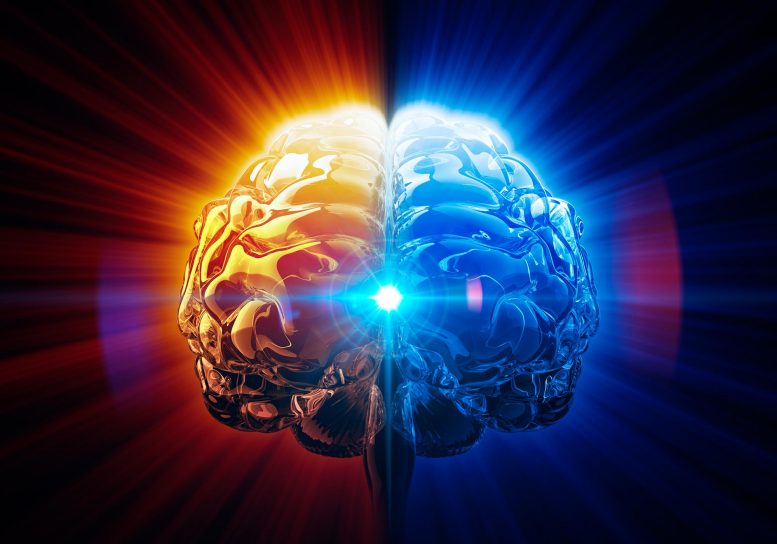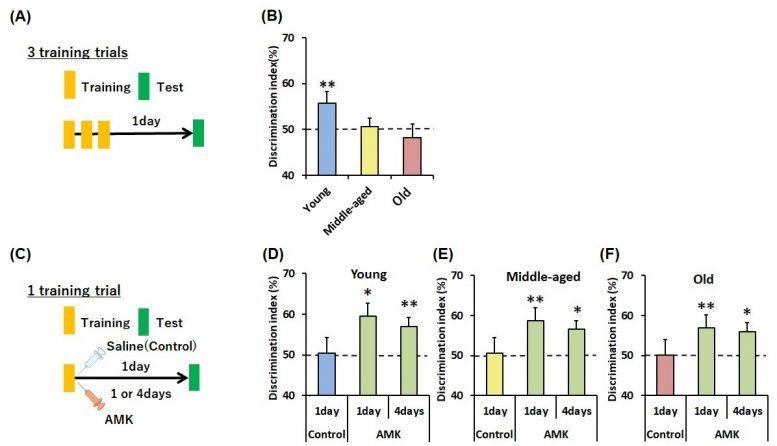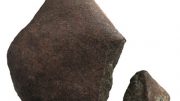
In a recent study, researchers demonstrated that melatonin and two of its byproducts aid in memory retention in the brain. They also have the potential to protect mice, and potentially humans, from cognitive decline.
Researchers at Tokyo Medical and Dental University (TMDU) in Japan show that melatonin and its metabolites promote the formation of long-term memories in mice and protect against cognitive decline.
Researchers at Tokyo Medical and Dental University (TMDU) showed that melatonin’s metabolite AMK can enhance the formation of long-term memories in mice. Memory of objects were tested after treatment with melatonin or two of its metabolites. Older mice that normally performed poorly on the memory task showed improvements as dosage increased. The metabolite AMK was found to be the most important as melatonin failed to improve memory if it was blocked from metabolizing into AMK.
Walk down the supplement aisle in your local drugstore and you’ll find fish oil, ginkgo, vitamin E, and ginseng, all touted as memory boosters that can help you avoid cognitive decline. You’ll also find melatonin, which is sold primarily in the United States as a sleep supplement. It now looks like melatonin marketers might have to do a rethink. In a new study, researchers led by Atsuhiko Hattori at Tokyo Medical and Dental University (TMDU) in Japan have shown that melatonin and two of its metabolites help memories stick around in the brain and can shield mice, and potentially people, from cognitive decline.
One of the easiest ways to test memory in mice is to rely on their natural tendency to examine unfamiliar objects. Given a choice, they’ll spend more time checking out unfamiliar objects than familiar ones. The trick is that for something to be familiar, it has to be remembered. Like in people, cognitive decline in mice manifests as poor memory, and when tested on this novel object recognition task, they behave as if both objects are new.

Three 1-minute training trials (A) revealed age-associated object memory decline in middle-aged and old mice at 1 day post-training (B). Systemic AMK (1 mg/kg) administered after a single 1-minute training trial enhanced object memory at 1 and 4 days post-training in all age groups (D-F). Data are presented as mean ± standard error. *P < .05 and **P < .01 indicate significantly different than chance performance (50%). Discrimination index (%) = time exploring novel object/ total object exploration time during test X 100. Credit: Department of Biology, TMDU
The group of researchers at TMDU were curious about melatonin’s metabolites, the molecules that melatonin is broken down into after entering the body. “We know that melatonin is converted into N1-acetyl-N2-formyl-5-methoxykynuramine (AFMK) and N1-acetyl-5-methoxykynuramine (AMK) in the brain,” explains Hattori, “and we suspected that they might promote cognition.” To test their hypothesis, the researchers familiarized mice to objects and gave them doses of melatonin and the two metabolites 1 hour later. Then, they tested their memory the next day. They found that memory improved after treatment, and that AMK was the most effective. All three accumulated in the hippocampal region of the brain, a region important for turning experiences into memories.
For young mice, exposure to an object three times in a day is enough for it to be remembered the next day on the novel object recognition task. In contrast, older mice behave as if both objects are new and unfamiliar, a sign of cognitive decline. However, one dose of AMK 15 min after a single exposure to an object, and older mice were able to remember the objects up to 4 days later.
Lastly, the researchers found that long-term memory formation could not be enhanced after blocking melatonin from being converted into AMK in the brain. “We have shown that melatonin’s metabolite AMK can facilitate memory formation in all ages of mice,” says Hattori. “Its effect on older mice is particularly encouraging and we are hopeful that future studies will show similar effects in older people. If this happens, AMK therapy could eventually be used to reduce the severity of Mild Cognitive Impairment and its potential conversion to Alzheimer’s disease.”
Reference: “The melatonin metabolite N1‐acetyl‐5‐methoxykynuramine facilitates long‐term object memory in young and aging mice” by Hikaru Iwashita, Yukihisa Matsumoto, Yusuke Maruyama, Kazuki Watanabe, Atsuhiko Chiba and Atsuhiko Hattori, 30 October 2020, Journal of Pineal Research.
DOI: 10.1111/jpi.12703









easily found in your drugstore
I am an 79 year old Male with an excellent memory; my wish is to maintain my memory. Your article gives me hope!
i am also a 79 year old male with an excellent memory, but like many post traumatic victims i have spent many dollars trying to forget or make sense of my life.
You should check out importance of breath to clear out toxins and negative memories
Check out SKY technique taught in artofliving.org
Or contact me [email protected] for more details
Could this help with ataxia.
Sounds promising great news for those with memory loss
Africans americans produce this naturally when they sleep. So they’re is no need for black men or women to buy it.
So you’re saying no black people have ever gotten alzheimer’s? Or forgot where they put their keys, or where they parked their car? I would think people of all races could benefit from this research.
Melanin, the skin pigment and melatonin are not the same chemical structure and have nothing to do with each other. 🚫
ALL people produce melatonin from the pineal glad at night time which helps induce sleep. It has nothing to do with race or ethnicity or skin color. You may be confusing it with melanin, however ALL people have melanin as well, just darker skinned people have more melanin than lighter skinned people. 😀
I would like to try this product
I would like yo try
Cool! Ah, science, in the age of fake news and cults…bit of hope!
What is the recommended dose of melatonin for an adult male?
I currently take a Lion’s Maine mushroom supplement.
Are there any drugs that interact with melatonin?
Interesting
Hoping memories will be saved, so we don’t make same mistakes & take care of each other.
I’d look like to try supplements (?)
I’d like to try this supplement
I’m in my 50+. (?)
My wife died of early onset Alzheimers in July after 11 years slow decline. How I wish we had known about this breakthrough before she passed! There is also very strong evidence that drug ISRIB can reverse many forms of memory loss,at least in animal trials. Since that drug not be approved by the FDA for at least another 5 to 8 years it wasn’t available to her either, What a shame! And yet after about 30 years of no progress against this horrific disease there is finally real hope for those who will come down with it in the next few years!
The problem is, melatonin may be sold as a supplement but it’s actually a hormone. (Supplements are things like vitamins, minerals, fiber, etc that your body needs but doesn’t produce on its own). As a person with insomnia issues, I’ve used melatonin sparingly as a sleep aid. It’s pretty irresponsible to not mention in this article that you’re not meant to take melatonin for more than two weeks straight, as it can disrupt the body’s natural production of the hormone and cause dependency.
My significant otheris 84 and experienceing some decline in his memory can you helphe for things. And seems a bit confused some days are better then others
I don’t have $49 until the 1st Thursday in February 2021! Ugggg
Where can I get it. Live in simcoe